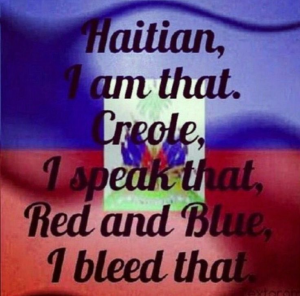by Robine Jean-Pierre
A linguist at heart, I cringe whenever I come across poorly translated phrases. While I am not fully fluent in all of them, I am familiar with Haitian Creole, French and Spanish, so I often find instances in which the fluidity, wit or meaning of a phrase gets lost when going from one language to another. It is also disappointing to hear a bi- or polylingual person trying to grasp for a term in their native tongue, saying, “It’s like… you know… well, I don’t know how you’d say it in English.” The feeling of exclusion that this provokes leaves me unsatisfied, and I believe that the language barrier can always be crossed, even when it comes to complex things like metaphors and idioms. The key is to translate for the meaning or essence of a word or phrase, even if at the expense of the actual words being used.
Haitian Creole is full of colorful, comical idioms, and I have often entertained myself by undertaking the task of finding their English equivalents. As I said, this is only effective if you go by meaning and not translation verbatim. I will give five examples (though I cannot guarantee I’ve spelled them all correctly).
1. Lè Ti Poul Fè Dan
The expression, “lè ti poul fè dan” in Creole literally means “when chicks teethe.” It is an informal way of responding “Never” to a question, since we know that chicks have beaks and will never grow teeth. If you said this in English, word for word, you would probably get a strange look from the person who asked the question, but never fear, we have the similar English expression, “When pigs fly.”
2. Mete Dlo Nan Diven Ou
“Mete dlo nan diven ou” is an expression that literally means “put [some] water in your wine.” This is a figurative way of telling someone to calm down; parents would say this to children that are acting up. It makes sense when you think of wine as something fiery and provocative, and that watering it down will diminish its strength. This is reminiscent of Bart Simpson’s “Cool your jets, man” (The Simpsons) or the simpler “Take it easy.”
3. Achte Figi Moun
“Achte figi moun” literally means “to buy someone’s face.” Think you can figure it out? You would have slim chances of hearing this in English word for word. This expression touches on the ideas of bribery and flattery, and would most closely link up with “kiss up to someone,” “suck up to” or “brown-nose.” I have mostly heard it used with a touch of infamous Haitian pride: “M’pa achte figi moun” (“I don’t kiss up to people”).
4. Ret Na Wòl Ou
“Ret na wòl ou” is actually not too far from English. It literally means “stay in your role” but links up with our “stay in your lane.” In other words, respect yourself and don’t overstep your boundaries.
5. Li Pa Gen Nen Nan Figi Li
“Li pa gen nen nan figi li” is not something you would want to hear someone say about you behind your back. The literal translation is “He/she doesn’t have a nose on his/her face.” It means that someone has no sense of dignity, pride or shame, like the archetypal nerd who keeps trying to join the cool kids’ clique even after numerous bold-faced rejections. (Maybe it comes from the idea that if this person did have a nose, he would immediately sense the obvious, kind of like when we say “You wouldn’t know __ if it hit you right between the eyes!”) After giving it a lot of thought, the only similar expressions that come to mind are “he’s a sucker” and “he hasn’t got a clue.”
The cleverness or “punch” of a phrase does not have to be sacrificed when you translate it from one language to another. Neither does the beauty of song lyrics or poetry. We may all speak different languages and belong to various cultures, but emotions and ideas are not limited to specific people groups. They are the universal building blocks of the human experience, and a bridge can always be made where there is understanding and effort.
Any funny expressions come to mind, either in English or another language? Please feel free to share in a comment below.




